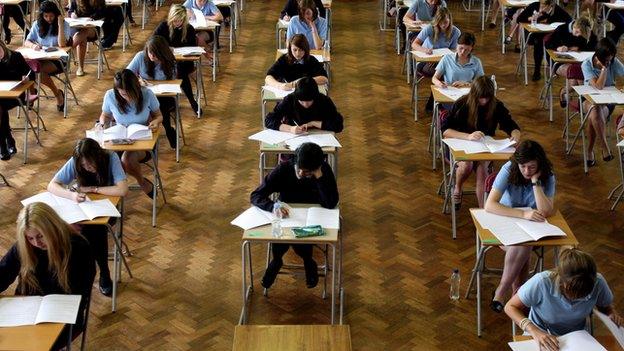Three political veterans predict the 2015 UK election
- Published
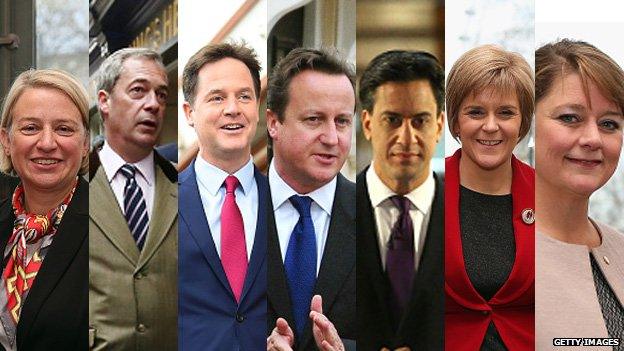
The broadcasters have proposed two live election debates featuring seven UK political parties
Three of the UK's most experienced election-watchers have predicted the Tories will do much better than expected in next May's general election but they still forecast another hung parliament.
Psephologist Sir David Butler, political consultant Sir Bob Worcester and politics professor Vernon Bogdanor have united to offer their often controversial views, based on nearly 200 years' combined experience.
The "three wise men" dismiss Liberal Democrat hopes of another coalition, while their views on a Europe referendum will delight supporters of UKIP.

Minority Conservative government?
All three experts agree that May's election will be one of the hardest to call since World War Two, because so many parties are now competing for votes.
They also all predict the vote will produce no clear winner and another hung parliament.
However, perhaps surprisingly, they say the outcome will not lead to another coalition.
Sir David Butler, the 90-year-old doyen of academic psephologists who has analysed every election since 1945, and Prof Vernon Bogdanor, 71, predict a minority Conservative government is the most likely outcome.
Sir Bob Worcester, who was the founder of the polling firm MORI, now Ipsos MORI, and the private pollster for Labour Prime Ministers Harold Wilson and James Callaghan, agrees the Conservatives may do better than many expect.
"Never underestimate the British public's tendency to 'hang on to nurse'. That will be a powerful motivating value at this election," he says.
Sir Bob, 81, says there are also signs UKIP's impressive vote share is beginning to drop back.
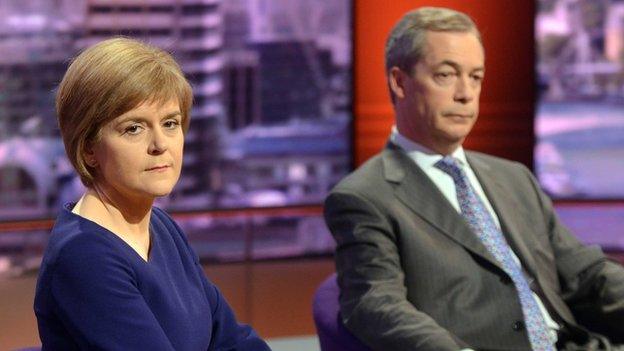
The participation of the SNP and UKIP make the 2015 outcome difficult to call
He raises the possibility that the Liberal Democrats might bounce back slightly from their dismally low poll ratings to replace UKIP in third place for share of the vote.
He also thinks the odds are narrowly against the Conservatives or Labour having a majority, but he is willing to wager three to one against there being another coalition.
Sir Bob predicts that whoever manages to form some sort of minority government, there would be a second general election in a year's time, in May 2016 "if they last that long".

Leaders' debates
There have been bitter arguments between the parties and the broadcasters over who should take part in any televised debate. All three agree this would be not much more than a sideshow.
Prof Bogdanor, who taught David Cameron politics at Oxford, says their impact would not be very significant.
"I wouldn't say they changed anything in 2010.
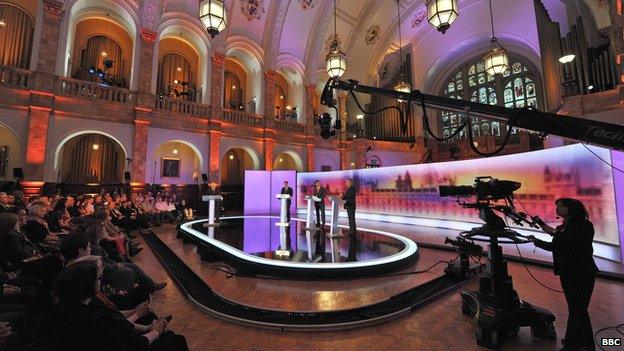
The leaders' debate, hosted by the BBC, was one of three held prior to the vote in 2010
"There was a surge to the Liberal Democrats but they then fell back and, though their vote went up a little, they actually lost five seats.
"There is no evidence that they would have done much different without the debates," he says.
Sir Bob believes the leaders' debates will not be as important as they were perceived to be in 2010.
He points out that there were three fairly new party leaders at the last election and increased public interest in the first leaders' debate.
With up to seven parties taking part, it would be very different this time, he says. And lessons have been learnt.
"Never again will both Labour and Conservative leaders be caught saying, 'I agree with Nick!'"
Sir David Butler bemoans the increasing "presidentialisation" of British general elections.
He says the influence of TV is largely to blame as it is now the primary source of information for voters.
Sir David points out that in 1950, 30% of voters told pollsters they had been to a public election meeting. By the time of the last election in 2010, this was down to just 3%.

Hung parliaments
Prof Bogdanor says voters are beginning to think that a hung parliament is the norm.
He believes Britain is becoming used to a multi-party system and the change will be permanent. Sir David Butler agrees a two-party system is a thing of the past.
Sir David says that parties are wrong to lay down too many so-called red lines on issues of policy that could give them difficulties during any coalition negotiations.
He highlights the way the Liberal Democrats were pilloried for their U-turn over university tuition fees.
"This could lead to claims of betrayal. When you rat on a policy, you lose a lot of credibility. I hope politicians will be wise to that," he says.
Vernon Bogdanor wonders whether a hung parliament after May's election would be similar to the result in 2010 or the one in 1974.
Five years ago, the coalition was able to command a clear majority in the Commons, leading to five years of stable government which, he confesses, he hadn't expected.
In February 1974 Tory Prime Minister Ted Heath tried to form a coalition with Jeremy Thorpe's Liberal Party.
Had Heath and Thorpe succeeded, their parties still would not have had an overall majority in the Commons. Prof Bogdanor says that would have meant "a fragmented hung parliament".
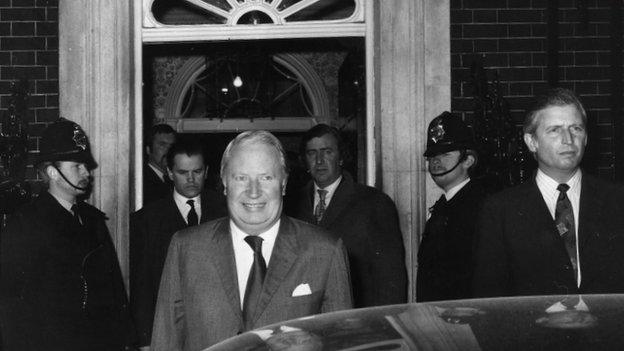
Ted Heath leaves Downing St for Buckingham Palace after conceding defeat in March 1974
He thinks this is the most likely result in May.
And although he doesn't foresee a new coalition emerging, he predicts that any future coalition deals might well have to involve three or more parties.
"We may come to see the five years after the 2010 election as a golden age of stability", he warns.

UKIP here to stay
Prof Bogdanor thinks the move to a multi-party system is permanent.
"The break-up of large social groupings such as the working-class or trade unions is undermining the tribal view of politics," he says.
He sees UKIP as a new class-based party that is here to stay.
UKIP represents, what he calls, "a new cleavage in British society, between the examination-passing classes and those who didn't go through higher education".
He says we used to think of the typical UKIP voter as a "retired army officer in Tunbridge Wells, spluttering over his gin and tonic".
Now, he thinks, the party is made up of those who feel alienated and are "united in being anti-Europe and against gay marriage, for example".
He says UKIP voters are "elderly, white, blue-collar, grey-haired, and more working class than those of the other major parties".
Prof Bogdanor continues: "This is the first bottom-up political insurgency since 1945, and I don't think it is short-term. It reflects changes in British society."
And in Scotland, the vote in the independence referendum was a "class" vote too, in the sense that the working class voted Yes.

Fixed-term parliaments
The Fixed-Term Parliaments Act, introduced by the coalition, has removed the prime minister's discretionary power to call an election when it's judged that his or her party has the best chance of winning.
Now general elections can only take place every five years unless two-thirds of MPs vote for an early poll, or a motion of no confidence is passed in the government and no alternative can be formed.
This first fixed-term at Westminster under the coalition has been condemned as a "zombie parliament", with many MPs calling for the act to be repealed.
Sir David Butler says politicians still have a lot to learn about what fixed terms really mean.
Prof Bogdanor says things would be very different now after an election if no party had an overall majority.
He says there would be some parallels with what happened when an inconclusive election delivered a hung parliament more than 40 years ago.
He notes that in March 1974, Labour under Harold Wilson replaced Ted Heath's Conservatives to rule as a minority government. Wilson was able to call a second election a few months later, in October, winning a majority but only just. Prof Bogdanor says things are now a lot different.
"We have fixed-term parliaments so it's more difficult to go to the country in just seven months' time. There is a way of getting round the act though," he says.
Other constitutional experts say circumventing the law may not be so simple.

Electoral reform
One significant area where the experts disagree is over the chances of there being another attempt to reform the first-past-the-post voting system used in UK general elections.
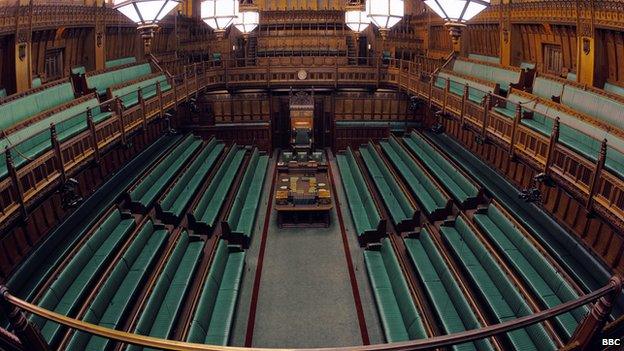
The first-past-the-post voting system could become an election issue, one expert predicted
Vernon Bogdanor predicts that calls for proportional representation (PR) will intensify after the election.
He says: "No government has achieved 40% of the vote since 2001.
"If we get another hung parliament, the government will have a relatively small percentage of the vote.
"So if UKIP gets, say, 10% of the vote, but just a couple of parliamentary seats, its supporters will protest .
"PR will become a major issue after the election."
This triggers a curt, Thatcheresque response from Sir David Butler: "No! No! No!"

Europe referendum
The final source of agreement may surprise many.
Both Prof Bogdanor and Sir Bob agree that there will definitely be a referendum on Europe, whoever wins the election.
UKIP's recent success means the public demand for a vote on whether Britain stays in or leaves the EU would be so strong, it would be virtually impossible for any government to resist, they say.
The comments in this article are reported from a forum discussion attended by Sir David Butler, Sir Bob Worcester and Vernon Bogdanor at the London School of Economics on 25 January.
- Published27 January 2015
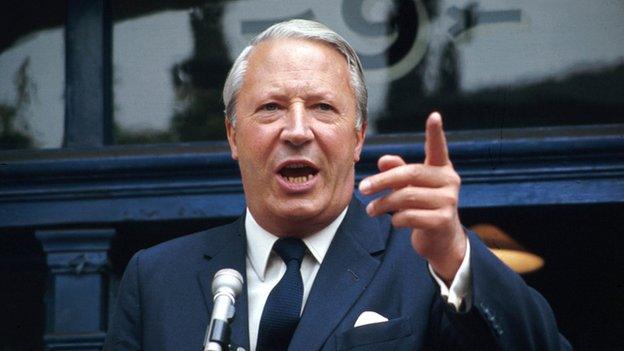
- Published4 March 2014
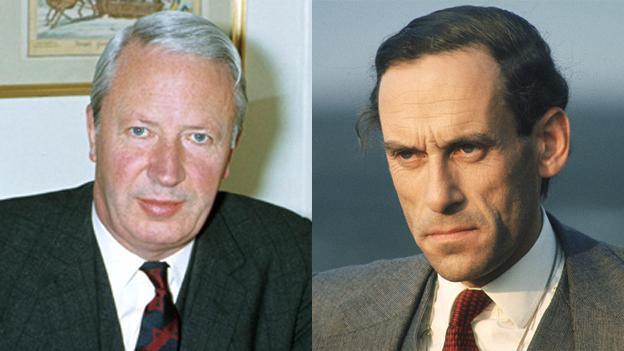
- Published20 January 2015
